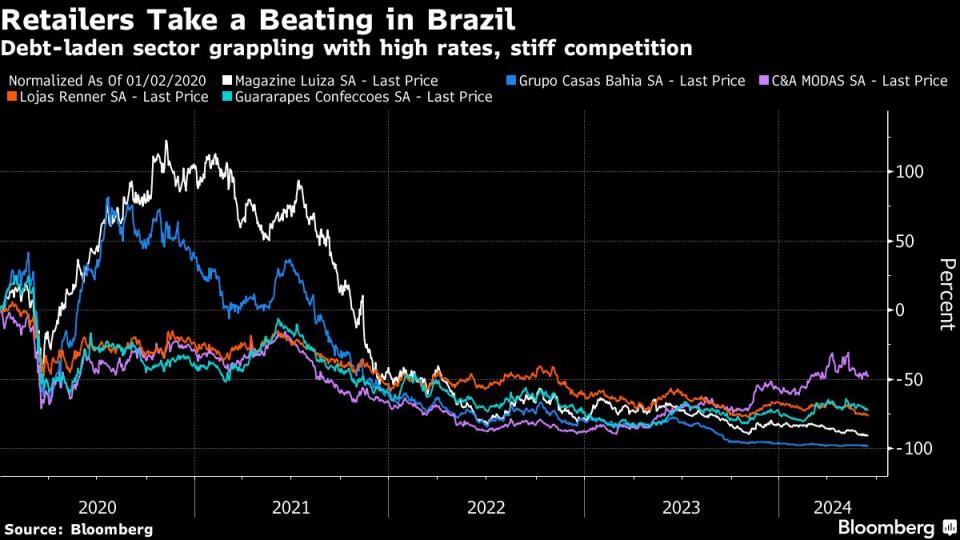Crop-Top Tax Offers a Bit of Relief to Struggling Brazil Retailers
(Bloomberg) -- A long-awaited import tax on purchases up to $50 will offer short-term relief to Brazil’s battered retailers as they stumble over longer-term hurdles.
Most Read from Bloomberg
Southwest Plane Plunged Within 400 Feet of Ocean Near Hawaii
Flesh-Eating Bacteria That Can Kill in Two Days Spreads in Japan
Wells Fargo Fires Over a Dozen for ‘Simulation of Keyboard Activity’
The bill approved in Brazil’s lower house Wednesday, which slaps a 20% levy on low-cost imports, is meant to contain growing competition from Asian fast-fashion players Shein Group Ltd., Sea Ltd.’s Shopee and upstart Chinese app Temu as they expand in Latin America’s biggest economy. It will take immediate effect once it receives a presidential signature.
It’s known in Brazil as the taxação das blusinhas, or crop-top tax, in a nod to the cheaper, cutoff shirts popular among young women, especially middle and lower classes across Brazil — an important group of voters for Luiz Inacio Lula da Silva, who initially opposed it.
But while domestic brands like C&A Modas SA, Lojas Renner SA and Guararapes Confeccoes SA could win back a few customers, the debt-laden firms are still facing higher-for-longer interest rates and a retail landscape radically altered by e-commerce and international competition.
“This new tax should help the competitive scenario and provide relief to Brazilian companies, but does not alleviate the problem,” Gustavo Senday, an analyst at XP Inc., said in an interview. The retail landscape “has also become more challenging with the arrival of new players.”
XP sees the bill as positive for middle-income apparel retailers but also e-commerce players including Magazine Luiza SA and Grupo Casas Bahia SA, which sell electronics and are also facing Asian competition in that segment.
Shares of Brazilian retailers rallied at the market open in Sao Paulo on Wednesday and June 5, when the Senate passed the bill, though the moves quickly faded. Under high rates and tough competition, retail shares have extended their years-long rout. Based on Thursday’s close, Magazine Luiza has plunged 48% so far in 2024, Lojas Renner is down 28% and Casas Bahia has dropped 47%.
“C&A considers the approval of the bill as another step towards tax equality among all retailers,” the company said in a written statement. Magazine Luiza, Lojas Renner and Casas Bahia declined to comment.
Brazilian companies need to have greater rights than foreign firms to continue generating jobs, Magazine Luiza founder Luiza Trajano told local newspaper O Globo, saying the bill “wasn’t ideal.”
To industry associations, which had been pushing for an import tax as high as 60%, the new measure is welcome but still not enough to ease competitive pressures.
“Foreign platforms, although with taxes still lower than the burdens long borne by Brazilian companies and society, are now partially living with the reality of the national tax burden, one of the highest in the world,” the Brazilian Association of the Textile and Clothing Industry and the Brazilian Textile Retail Association said in a statement.
Lula, meanwhile, said at first that if the bill passed he would veto it, given it could prove unpopular by driving up prices. But after congressional negotiations, the government eventually agreed to reinstate the import tax even though it’s a blow to the president’s efforts to lift entry barriers for foreign players.
“This bill will make imported products a little more expensive, but they will still be more accessible than buying from big brands like Lojas Renner or e-commerce players like Magazine Luiza,” Pedro Serra, head of equity research at Ativa Investimentos, said in an interview.
“Local retailers will need to focus on competitiveness, but not on price, because on price they will not be able to compete,” he added. “They now need to be competitive in the consumer experience, from purchase to checkout.”
--With assistance from Daniel Carvalho, Rachel Gamarski and Barbara Nascimento.
Most Read from Bloomberg Businessweek
Grieving Families Blame Panera’s Charged Lemonade for Leaving a Deadly Legacy
Israeli Scientists Are Shunned by Universities Over the Gaza War
The World’s Most Online Male Gymnast Prepares for the Paris Olympics
©2024 Bloomberg L.P.

 Yahoo Finance
Yahoo Finance 

